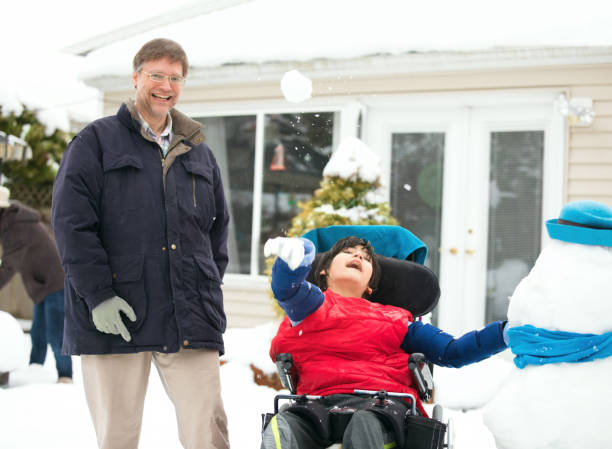With today marking the beginning of winter, much of the country has experienced significant drops in temperatures. Although most experience only minor inconveniences, many children with cerebral palsy must endure increased limitations including seclusion, illnesses and bodily discomfort. With that, Children’s Cerebral Palsy is sharing different ways that children living with CP can keep warm, avoid unnecessary discomfort, and enjoy the winter.
The first concern to address is whether or not your child is appropriately clothed for colder weather. Choose clothing that can be easily donned or taken off. Colder temperatures can lead to stiff muscles and increased soreness, which will mean less comfortable nights of sleep. Consider purchasing an electric blanket for your child to sleep with at night.
Between the drop in temperatures and enforcement of the most recent COVID-19 mandates, this can mean a lot more time at home for all kids, especially those with a disability. For children with physical limitations, this time can be extremely isolating. To help quell the boredom during these times, parents should look to plan indoor activities for their child with CP, such as cooking, crafting, gaming and other activities that focus on building muscle strength and coordination.
Decreasing temperatures bring inevitable winter illnesses. This can be more costly when dealing with compromised immune systems or other health disorders. Ensuring your child’s medical records are up to date and list the different medications your child takes is helpful in emergency medical situations, especially if you are traveling and can’t see your child’s primary care physician.
Lastly, cold weather can cause your child with cerebral palsy severe discomfort through further stiffness of muscles and joints, cramping, aching and more. Depending on the symptoms, additional medical action may need to be taken. Because every case of cerebral palsy is different, it’s important for parents to be observant of their child’s symptoms. Designate time to speak with your child’s doctor about anything you’ve noticed and possible treatments or solutions to help mitigate discomfort.
Winter can be tough for children with cerebral palsy, but going the extra mile to ensure your child is prepared is of paramount importance. In addition to the suggestions listed above, parents should talk with their child about their winter experiences and what can be done to help improve them. If you have immediate questions or concerns about preparing your child with CP for the winter, contact Children’s Cerebral Palsy today.






